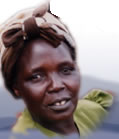THEMES IN THIS
TESTIMONY
Agriculture

Culture and Customs

Education

Identity

Land

Social Change

Social Relationships

Click on arrows
to find more
testimonies
featuring
these themes
|
|
Sex
|
Male
|
|
|
Age
|
30
|
|
|
Identity
|
Sabaot
|
|
|
Occupation
|
Farmer
|
|
|
Location
|
Cheptais
|
|
|
Date
|
1997
|
|
summary
Though difficult to follow at times, this interview yields interesting and illuminating material, and the narrator describes many of the problems which he perceives face the Sabaot. Intermarriage between his people and the neighbouring Bukusu is, for him, the main reason why there have been changes in his culture, particularly in relation to education, social relations, language, technology, and agricultural practices. Although this has led to what he perceives as positive changes, such as the introduction of new agricultural technology and cash crops, he laments the loss of language and custom, and the social disruption that has come about. This interview highlights the ambiguity the Sabaot seem to feel towards the changes that have been affecting their society, a theme that runs through most of the testimonies in this collection.
Indeed, Robert Kibocha perceives the “tug of war” between traditional education and the “modern academic” system as one of the most important issues affecting the survival of the Sabaot culture. This has led, in his belief, to poor social relationships between the young and the old, and a decline of people’s knowledge of their community roles: “…those that are academically educated despise the old telling them that they are young and do not know anything…. And then I feel also the old should be given enough time and encouragement to bring back the old ways of living. They should also be given power to feel that they have an important role to play in the culture, in the development of the Sabaot.” Younger generations often are brought up in cities such as Nairobi and spend little time with their grandparents. And also lost with the modern system, are the songs, which convey meaning about past events, and which were used by grandmothers for the cultural education of the young.
It is interesting to note that like many other older narrators, Robert Kibocha is ambivalent about modern education. While he blames the under-representation of Sabaot in government on the lack of educated and literate Sabaot, he also blames modern education for the disintegration of their culture.
detailed breakdown
|
You will need a password from Panos to view the full
transcript of the interview. To apply for a password, click here.
Once you have a password, click here to go to the beginning
of the transcript. You can also click on any section of the
breakdown of content below and go straight to the
corresponding part of the transcript.
|
| Section 1-2 |
Introduction of agriculture into the area - how the Sabaot learnt about cultivation from the Bukusu and Teso: “These are the people who had this knowledge of cultivating other crops.” Importance of cash crops such as coffee, which is the primary one. Narrator believes intermarriage with the Bukusu has been the main instigator of change within Sabaot culture and society: “Bukusu had cultures which were different from ours. When you intermarry, these cultures are married.”
Horticulture emerging as a new income activity, but too expensive for most people.
|
| Section 2-3 |
Churches have been the main instigators of development in the area: “…most of the schools were started by churches”. Other organisations such as ActionAid have also contributed to development in the area. The narrator believes there is still need for infrastructural development.
How the Church helped those who were displaced by the recent clashes.
|
| Section 3-4 |
Causes of the clashes with the Bukusu: diminishing land due to growing population (and displacement by government for forest conservation reasons), and politics. Belief that government doesn’t care about the Sabaot because they haven’t helped with the problems of insecurity in the area. The government sent “homeguards” to protect against the clashes and the problems this itself brought: accusations of cattle rustling. Affect of clashes on local boys: dropping out of school, and turning to crime.
|
| Section 5-6 |
Problem of the Sabaot lacking a public voice: “Learned people among the Sabaot are very few and they do not have good advocates to advocate for these people.” Also problem of poor roads adds to their isolation. How the Sabaot have been given their own district since the clashes, and how there is a need for them to be given more land. The clashes affected education in the area as a lot of the teachers were Bukusu, and when the conflict started they ran away.
|
| Section 6-7 |
Cultural activities in the past: songs and stories told by grandmothers: “From them they were taught songs that contained meaning.” Communities’ role in “correcting” attitudes among the young. Songs used to record historical events that happened in the community. Narrator believes there is “a tug of war between that cultural education (traditional) and the present academic education”, which has created animosity between the young and the old.
Gender roles.
|
| Section 8 |
How Sabaot society has changed and the narrator’s belief that this is because “the old are discouraged somehow in one way or another. Because if they feel that they are not recognised in the community, then any chance of them giving out their experiences…they will not be in mood to tell them.” How the young don’t go to their grandmothers anymore for cultural education. The narrator also believes the modern education system has exacerbated this change by often taking children away from their homes. He also sees education, alongside intermarriage with the Bukusu, as leading to a decline of the Sabaot language, and wonders at a possible solution to this problem: “Maybe if there was a book for Sabaot to be used in schools. Maybe through that, some cultural values will be maintained.”
|
| Section 10 |
Believes leisure activities for the young should be controlled by the old.
Different types of Sabaot songs and their role in educating the young. How these songs and dances are dying out - points out that anyone wanting to hold a music festival has to register it in Nairobi, but some who have lived in rural areas all their life won’t know the city, “which is another way of killing [the festival]”.
|
|


